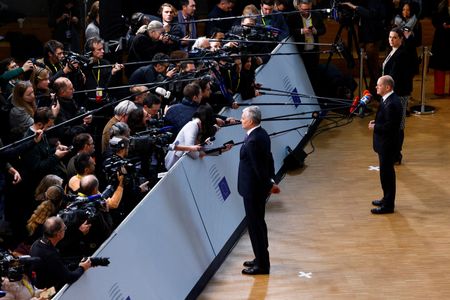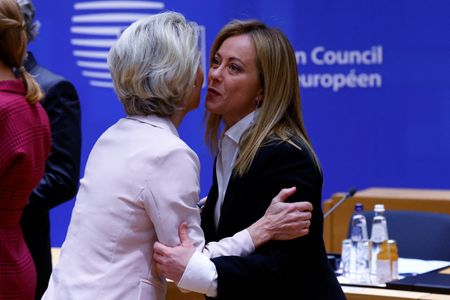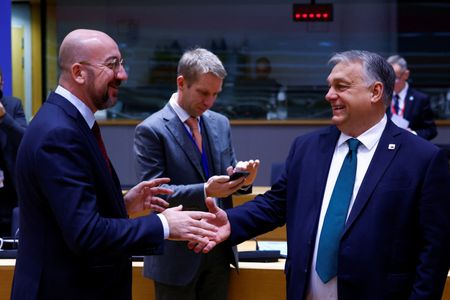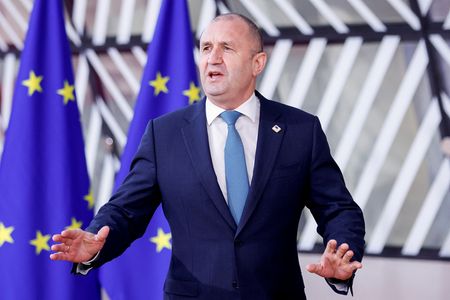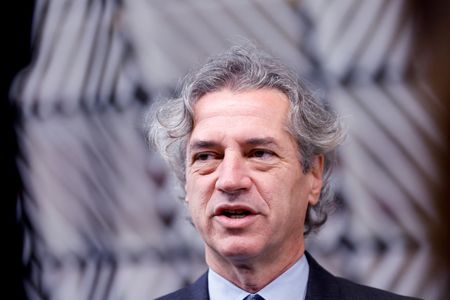By Sabine Siebold and Bart H. Meijer
BRUSSELS (Reuters) -European Union leaders wrapped up their last summit of 2022 with an agreement to provide 18 billion euros in financing to Ukraine next year and slap more sanctions on Russia as the EU also prepared to cap natural gas prices and prop up its industry.
Poland withdrew last-minute objections to a global minimum corporate tax, unblocking a package of linked agreements that includes the loan to Ukraine, where a war has raged since Russia launched an invasion in February that Moscow refers to as a “special military operation”.
As Ukrainian President Volodymyr Zelenskiy predicted that the months to come would be ever harder than the war had already been on his country, German Chancellor Olaf Scholz promised more aid.
“Our joint determination to support Ukraine politically, financially, militarily and in the humanitarian area for as long as necessary remains unbroken,” Scholz said after talks among the 27 national EU leaders in Brussels.
U.S. Treasury Secretary in a written statement applauded the global minimum tax agreement.
“This historic agreement helps level the playing field for U.S. business while protecting U.S. workers,” Yellen said.
The summit capped a tumultuous year which saw the EU close ranks to support Ukraine but often struggle to agree how much pressure to put on Moscow.
On Thursday, however, EU leaders also agreed to a ninth package of sanctions against Moscow to blacklist nearly 200 more people and bar investment in Russia’s mining industry, among others.
The decision, which requires unanimity, was made after Poland and Lithuania had warned that proposed exceptions for food security might benefit Russian oligarchs in the fertilizer business.
INTO 2023
After much disagreement throughout the year, the EU also seemed to be coming together on how to cap gas prices, and the leaders gave their ministers the task of finalising that work on Monday. Even Scholz, who has led the opposition to such a market intervention, expected a final agreement then.
With heating reduced in EU buildings as part of measures to save energy, some leaders were seen wrapped in big shawls as they gathered to discuss their response to the U.S. Inflation Reduction Act – $430 billion worth of tax breaks for green energy.
Belgian Prime Minister Alexander De Croo said the EU risked deindustrialisation as energy prices soared on the back of the war in Ukraine as European companies also faced the threat of subsidy-fuelled U.S. competition.
Poorer EU countries want a coordinated response and warned richer member states like Germany against supporting their industries without showing solidarity with the rest of the bloc.
“Today we see that too often countries are trying to install schemes on their own. It looks a bit like a game of the deepest pocket,” said de Croo.
The summit charged the EU Commission with making specific proposals early next year to prop up the EU’s cutting-edge industries – including biotech and AI – while also preserving competition inside the bloc’s cherished single market of 450 million consumers.
The summit also granted Bosnia and Herzegovina formal EU candidate status and the leaders agreed to meet again in February to talk about increasing immigration to the EU.
Still, the gathering was overshadowed by a corruption scandal rocking the European Parliament.
After Belgian prosecutors charged Eva Kaili, a Greek member of the EU chamber, and three others for accepting bribes from World Cup host Qatar, European Parliament chief Roberta Metsola said the assembly “is not for sale”.
She said the house would have an in-depth review of how it deals with third countries and reinforce whistleblower systems.
Belgian police said it seized nearly 1.5 million euros in cash during raids related to the case, and released pictures of the loot including a black travel suitcase overflowing with 50 and 100 euro notes. Qatar and Kaili have denied any wrongdoing.
($1 = 0.9395 euros)
(Reporting by John Chalmers, Phil Blenkinsop, Gabriela Baczynska, Sabine Siebold, Jan Strupczewski, Benoit Van Overstraeten, Kate Abnett, Tassilo Hummel, Michel Rose, Bart Meijer and Dan Whitcomb; Writing by Ingrid Melander and Gabriela Baczynska; Editing by Alexandra Hudson, William Maclean, Grant McCool & Simon Cameron-Moore)

